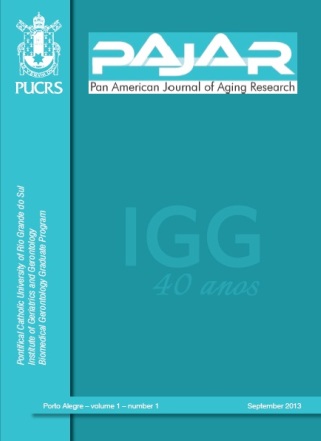Number of teeth and chewing satisfaction related to cardiometabolic, vascular diseases and self-perception of health in older adults
Palabras clave:
oral health health evaluation aged metabolic diseases cardiovascular diseases cerebrovascular accidentResumen
Aims: To determine the association of chewing satisfaction and number of teeth with cardiometabolic and vascular diseases and self-perception of health (SPH) in the elderly.
Methods: An observational and population-based cross-sectional study was conducted with the participating elderly of the Multidimensional Study of Elderly of Porto Alegre
(EMIPOA) who responded to a questionnaire about their oral health, which was applied by telephone. The following variables were analyzed: sex, age, age range, chewing
satisfaction, number of teeth, SPH, coronary artery disease (CAD), cerebrovascular accident (CVA), diabetes mellitus (DM), Hypertension (SAH) and obesity.
Results: There were 251 elderly evaluated averaging on age 72.5±7.6 years. The mean number of teeth was 8.80±8.91 while chewing satisfaction was reported by 52.2%. A significant association (P<0.05) was observed between satisfaction with chewing ability and mean number of teeth, DM and SPH (dissatisfied elderly had a lower mean number of teeth, poor/awful SPH and greater prevalence of DM). A significant association was also
observed between mean number of teeth and age range, SPH, CVA, CAD, SAH (lower mean number of teeth in elderly ≥80 years and with fair/poor perception of health and the morbidities described).
Conclusions: In the elderly of EMIPOA, oral health was found to be associated with age
range, cardiometabolic and vascular diseases and self-perception of health.
Descargas
Descargas
Publicado
Cómo citar
Número
Sección
Licencia
Derechos de Autor
La sumisión de originales para la PAJAR implica la transferencia, por los autores, de los derechos de publicación. El copyright de los artículos de esta revista es el autor, junto con los derechos de la revista a la primera publicación. Los autores sólo podrán utilizar los mismos resultados en otras publicaciones indicando claramente a PAJAR como el medio de la publicación original.
Creative Commons License
Excepto donde especificado de modo diferente, se aplican a la materia publicada en este periódico los términos de una licencia Creative Commons Atribución 4.0 Internacional, que permite el uso irrestricto, la distribución y la reproducción en cualquier medio siempre y cuando la publicación original sea correctamente citada.





 >
>